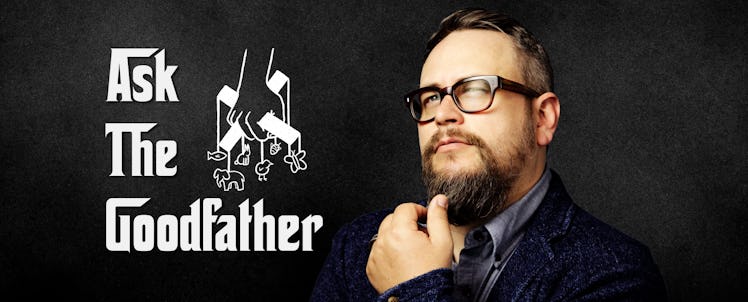My Wife And I Are Fighting Way More In Quarantine. Will It Mess Up My Kids?
Parents are fighting more right now. That's to be expected. But the kids are there to witness it all. Is this a problem?

Goodfather,
My wife and I had a big fight the other day about groceries. It was a dumb fight, but we were both on edge, frayed from stress, overworked, and, well, it blew up. The kids witnessed it because… in quarantine, how could they not? Our toddler acted up for the rest of the day and had his first massive tantrum. The grade-schooler said, “mommy, daddy, no!” and then closed herself in the room and didn’t want to talk about it again.
The fight was a fight. We made up. It wasn’t that big a deal to us… but the kids can probably feel that energy still and are waiting for the next one. The thing is, there will be a next one, you know? How could there not be in this stressful situation? It won’t hurt our marriage — we know how to make up and all — but the kids are now on edge from the outside world (masks and no friends and all that) and … now inside. What can we do?
Knocked Out in Knoxville
My parents divorced when I was in grade school. The end of their relationship was marked by a year of shouting matches that, 40 years later, I still remember. The reason those arguments stand out to me is that when the yelling stopped there was no resolution, no forgiveness, no reparation. They had no problem fighting in front of me, but they could not find it in themselves to make up, in front of me or otherwise.
All these years later I blame the fire and ignorance of their youth more than I blame them — they were in their early 20s, married as teens, and ill-prepared for starting a family. Conflict happens. Fights happen. But it’s the making up that makes all the difference.
Importantly, you and your wife made up. But when the next fight occurs, I want you to make it a priority to make up in front of your kids.
The stakes here are slightly higher than you may realize, and not just because we’re all parenting in a pandemic. Yes, when you fight, your kids feel acute stress watching the people they count on for stability become temporarily unstable. You should absolutely be mindful about the big feelings they are having now. But your bigger concern should be the relationship lessons they’ll carry into the crises arise in their own futures.
You may not realize it, but the way you and your wife interact is creating your children’s foundational understanding of how two people who love each other behave. Some parents get freaked out by this fact and become determined to hide every conflict and trouble from their children. But constantly hidden conflict can be just as bad as constant conflict without resolution. A kid who never sees their parents work through problems will likely struggle to develop the skills they need to work through problems in their own relationships.
This might sound strange, but I encourage you to have conflicts in front of your kids. My one caveat is that you keep the arguments civil, practice active listening, “I feel” statements and try to keep name-calling, accusations, and raised voices to a minimum. More than that though, I encourage you to make up in front of your kids too. Apologize when apologies are necessary. Make a concerted effort to talk about how to move forward and repair the relationship. Put a bow on the whole thing with an “I love you.”
This is good for future fights, but it’s not going to help kids who are stressed out from the last fight. So, it’s time to talk to them about it. Your grade-schooler will be particularly helped by this. Sit down as a family, someplace comfy, maybe even pile into a cuddle, and just let them know that you and mommy love each other very much. Let them know that it’s okay for people who love each other to disagree and that disagreements don’t diminish love. Ask if they have any questions and answer them as honestly and as simply as you can.
Then pass around some bowls of ice cream, watch a movie, and share some laughs.
Since the advent of social media, parents have considered raising kids performative — as evidenced in the proud posts and kid photos that litter our feeds. We got it about half right. Parenting is absolutely performative, but the most important audience is not on the other side of a screen, they the very people that we are parenting. And the fact is that now, more than any other time, they see more of our performance than is likely comfortable for us. It might help to remind yourself every once in a while that the kids are watching.
It took my parents a very long time to figure that out. But it’s also not knowledge one would arrive at naturally. I didn’t figure it out myself until I started working at Fatherly and talking to child psychologists and researchers far smarter than me. So there’s no need to beat yourself up about it. Also, there’s no need to be perfect, but it makes how you approach your imperfections particularly important.
You and your wife are only human. You’ll struggle. Your kids will struggle too. But they will be better for watching how you came through adversity, stubbornly clinging to love at all costs.